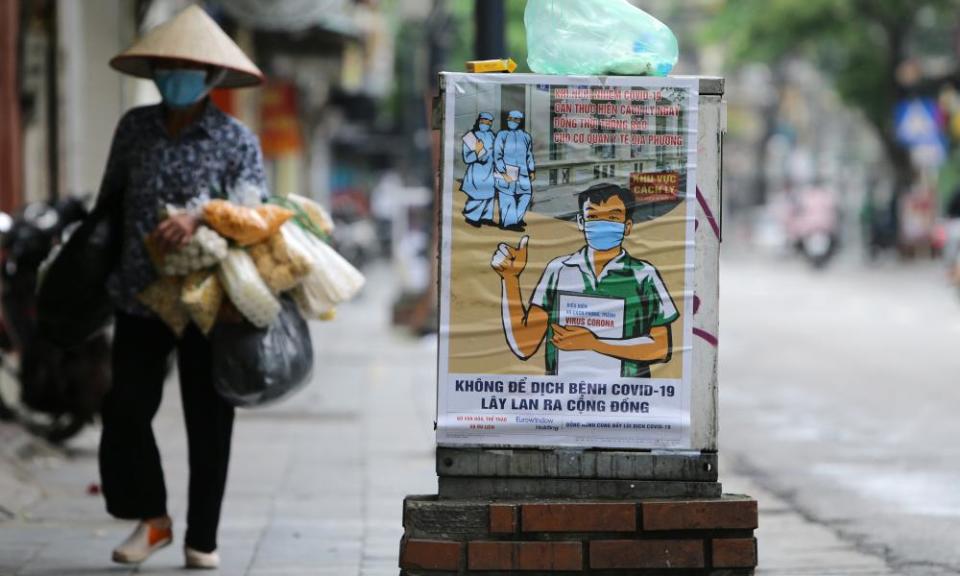British Covid-19 patient in Vietnam could have lung transplant

A 43-year-old British man may undergo a lung transplant in Vietnam, where he is critically ill with Covid-19.
The man, a Vietnam Airlines pilot, developed a fever and cough on 17 March, and was later admitted to Ho Chi Minh City Hospital for Tropical Diseases.
He is on a extracorporeal membrane oxygenation machine, a form of life support used when a person’s heart or lungs are unable to function fully, and is being treated with antibiotics and dialysis, the government’s news portal VGP News reported.
Lung ultrasound scans indicate his right lung has collapsed, according to a Ministry of Health report published on Monday. The man is reportedly experiencing cytokine storms, an overreaction of the immune system. Regular updates are published on state media, and many in the country have commented online, wishing him well.
Related: Aggressive testing and pop songs: how Vietnam contained the coronavirus | Trang Bui
At a meeting on Thursday focused on new Covid-19 treatment and testing strategies, Prof Nguyen Van Kinh, an infectious diseases specialist, said doctors were “considering the option of performing a lung transplant for the patient”.
In March, a medical team in China reportedly carried out a double lung transplant for a patient infected with Covid-19. The 59-year-old patient was successfully treated at a hospital in east China’s Jiangsu province, according to the state-run Global Times. Two patients who had the coronavirus in Wuhan are also reported to have received successful lung transplants.
The British patient in Vietnam became ill after visiting a bar in Ho Chi Minh city, Buddha Bar, subsequently linked to a cluster of 19 cases.
Vietnam, a country of 96 million people, which shares a border with China, has so far recorded just 288 cases of Covid-19 and no deaths, owing in part to its aggressive contact tracing campaigns, clear public health messaging and quick action.
default
When a patient tests positive for the virus, they are assigned a patient number and their anonymised travel history – including details where they have eaten, or where and when they went to a market or bar – are publicised online and on state media. At-risk people are then required to report to health authorities to be tested. Anyone found to spread fake news has been fined.
The country has gradually increased its testing capacity while organising mass quarantines of contacts potentially exposed to the virus. In early April, when the highest numbers were quarantined, Vietnam isolated nearly 70,000 people, including more than 44,000 in military camps and university dormitories. All arrivals from overseas are subject to a mandatory 14 days’ quarantine.
The country has carried out more than 260,000 tests, which are free for almost all cases. A nationwide lockdown was eased two weeks ago, and Vietnam has been without community transmission for 22 days.
Dr Tran Dac Phu, a senior adviser at the public health emergency operations centre under the Ministry of Health, said: “Vietnam’s strategy is to contain the number of cases, so that the number of patients that need treatment, the number of critical cases, can be kept low so it doesn’t blow up the health system. Many countries with high number of cases have lots of critical patients.”
There are now 47 active infections, the health ministry said on Friday, and two seriously ill patients.

 Yahoo Sports
Yahoo Sports 